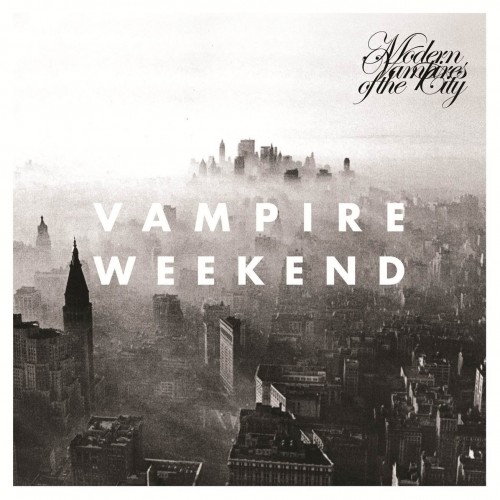
Vampire Weekend has often been accused of making rather frivolous music that appeals mainly to hipsters, and, in many respects, that accusation is true of their first two albums, Vampire Weekend and Contra. Yet, I personally think that criticizing a band for writing about what they know, especially early in their career, has little merit. You never know when a band is going to take the next step and begin to touch on bigger ideas and struggles than, say, the use of the oxford comma or drinking horchata. On Modern Vampires of the City, the band retains its quirky, anything goes brand of indie pop, but the album abounds with weightier and more universal themes. In comparison to Vampire Weekend’s first two albums, Modern Vampires is full of maturity and depth, as lead singer Ezra Koenig explores death and God in his lyrics with an intensity not seen on their previous albums. The music reflects this added depth, too, as the album sounds more expansive than the band’s first two records. Each song is instrumentally and vocally packed, making for an impeccably layered album that abounds with creative energy.
 “It’s been twenty years and no one’s told the truth,” laments Koenig on the album’s opening track, “Obvious Bicycle,” setting the stage for rest of Modern Vampires and its preoccupation with truth and doubt. Beautifully written, “Obvious Bicycle” transforms throughout its four-minute running time, beginning with just the consistent beat of a drum and piano, before hitting the chorus where Koenig’s vocals are buoyed on a sea of background vocals that resound as if in a cathedral. The bridge of “Obvious Bicycle” marks the first time on Modern Vampires where chambered vocals (sounding almost like Gregorian chant) burst into the musical background, a re-occurring sound over the course of the album. Carrying on the theme of truth and doubt, “Unbelievers” immediately follows “Obvious Bicycle,” and injects a shot of energy into the album with its pounding bass drum and quick tempo. As its title suggests, “Unbelievers” focuses on questions of belief and faith, offering up some of the album’s most intriguing lines: “If I’m born again, I know that the world will disagree. Want a little grace, but who’s going to say a little grace for me?” The questions that Koenig asks during “Unbelievers” don’t get answered until later in the album, but they provide an interesting thematic background to the beginning of the album.
“It’s been twenty years and no one’s told the truth,” laments Koenig on the album’s opening track, “Obvious Bicycle,” setting the stage for rest of Modern Vampires and its preoccupation with truth and doubt. Beautifully written, “Obvious Bicycle” transforms throughout its four-minute running time, beginning with just the consistent beat of a drum and piano, before hitting the chorus where Koenig’s vocals are buoyed on a sea of background vocals that resound as if in a cathedral. The bridge of “Obvious Bicycle” marks the first time on Modern Vampires where chambered vocals (sounding almost like Gregorian chant) burst into the musical background, a re-occurring sound over the course of the album. Carrying on the theme of truth and doubt, “Unbelievers” immediately follows “Obvious Bicycle,” and injects a shot of energy into the album with its pounding bass drum and quick tempo. As its title suggests, “Unbelievers” focuses on questions of belief and faith, offering up some of the album’s most intriguing lines: “If I’m born again, I know that the world will disagree. Want a little grace, but who’s going to say a little grace for me?” The questions that Koenig asks during “Unbelievers” don’t get answered until later in the album, but they provide an interesting thematic background to the beginning of the album.
The first half of Modern Vampires deals with big questions of truth and doubt, placing those questions within a sense of mortality that pervades the album. “Step,” the album’s third track, a slow-burning, harpsichord-love letter to music, straightforwardly confronts death’s specter: “We know the true death, the true way of all flesh. Everyone’s dying, but girl, you’re not old yet.” The cautious, contemplative “Step” transitions into the raucous romp of “Diane Young,” and while their music may be quite different, death is still the focus. “Diane Young,” a fun spin on “dying young,” reflects this even in its music, a clear nod back to 1950s era rock’n’roll, right down to Koenig’s repeated use of the word “baby.” The final verse of “Diane Young” provides one way of dealing with mortality: “Nobody knows what the future holds and it’s bad enough just getting old. Live my life in self-defense, you know I love the past, cause I hate suspense.” Completing the triad of songs in the first half that blatantly address issues of death, “Don’t Lie” offers a different take on death than “Diane Young.” Appropriately, “Don’t Lie” opens with a haunting organ and echoing drums, creating a sacred space for the song’s lyrics: “Don’t lie. I want him to know God’s loves die young. Are you ready to go?” Musically, “Don’t Lie” is one of my favorites from the album, as it takes on almost an orchestral feel from its midpoint, which gives the song a sense of grandeur appropriate for the subject matter it is exploring. Koenig’s lyrics in the chorus, which often subtly change, show an acute awareness of how death and mortality can affect everyday life: “Does it bother you? The low click of a ticking clock. There’s a lifetime/headstone right in front of you and everyone I know.” Here, Koenig suggests that it is a matter of perspective whether or not we treat the present as a lifetime of possibilities or a portent of eventual death and decay.
Modern Vampires spends its second half searching for answers to the questions posed on the first half of the album, and arrives at some interesting conclusions by the time the album comes to a close. Conjuring up obvious religious images, “Everlasting Arms” is one of the most profoundly spiritual songs I’ve heard this year, as Koenig’s lyrics vacillate between faith and doubt, often within the same line. With repeated refrains and a sporadic organ, “Everlasting Arms” reminds me of a hymn, even though its lyrics are the uncertain ramblings of broken man. In that regard, perhaps it is a perfect hymn: “I hummed the Dies Irae, you played the Hallelujah. Leave me to my cell, don’t leave me in my cell.” Invoking a 13th century hymn about God’s Day of Wrath in a pop song is a bold move, but on an album consumed with analyzing these contradictions and paradoxes it comes across as a powerful moment. In my estimation, the album’s clearest answer to the paradoxes of faith comes on “Ya Hey,” a gloriously weird song that addresses God, receiving a cryptic message in response: “Through the fire and through the flames, you won’t even say your name. Only I am that I am.” On “Ya Hey,” all the questions are met by the voice of the burning bush, as the choral background vocals strive to create a similar holy ground experience. To Ezra Koenig as to Moses, I am that I am becomes the answer to the paradoxical questions of faith.
But, there are a few questions that are answered on Modern Vampires of the City, and one in particular that I want to return to as I end. On “Unbelievers,” Koenig asks, “Who’s going to say a little grace for me?” The answer comes on “Ya Hey”: “I can’t help but feel that you see the mistakes, but you let it go.” The mistakes, the problems, the fears, the insecurities, the evil acts of man, are let go by I am that I am who speaks grace into the world. To this idea, Koenig poses another question at the end of the chorus to “Ya Hey”: “But who could ever live that way?” If you’ll permit me, I’ll offer my own answer to that query: no one can. That’s what makes it grace. Vampire Weekend explores these questions with their characteristic wit and musical creativity, but the answers they provide are what will keep me coming back to Modern Vampires of the City, one of the best albums of the year so far.
[youtube=http://www.youtube.com/watch?v=i-BznQE6B8U&w=600]

COMMENTS
4 responses to “New Music: Vampire Weekend’s Modern Vampires of the City”
Leave a Reply














Great review as usual, Carl. I will admit that when I listened to their first album, I didn’t really pay much attention to the lyrics, but I just really did not like the music. If music sounds too peppy or sugary-sweet then I tend to push it off of my playlist. That’s why it takes a lot of work to get me to listen to pop music, generally. However, from your description of the content and music of this album, I will have to give this one a shot…and, who knows, it may force me to confront their earlier albums once again for a reappraisal.
This is by far my favorite of their albums, and the album is paced wonderfully. So there are a few less pop heavy songs here as well. Try out “Hudson” and move from there.
I too have a difficult time with Vampire Weekend, though I’m trying harder to understand their style. The best I’ve been able to come up with is the admittedly pretentious phrase “baroque pop,” and I include fun. in that same category of heavily exaggerated, yet light ‘n fluffy pop. VW even used a harpsichord in their previous album, for Pete’s sake! Anywho, I recognize there’s something there, but I’m with Blake- the learning curve here is steep! Ya Hey and this review, however, have convinced me to try VW again. Thanks for this Carl!